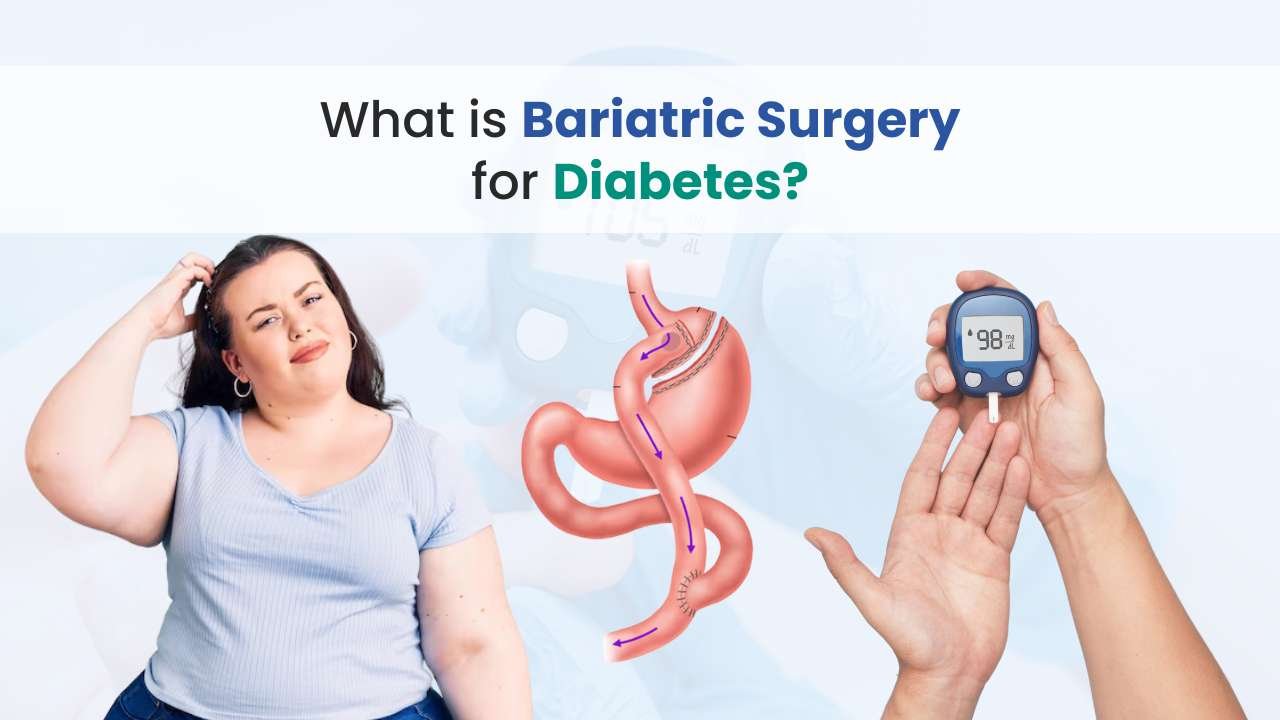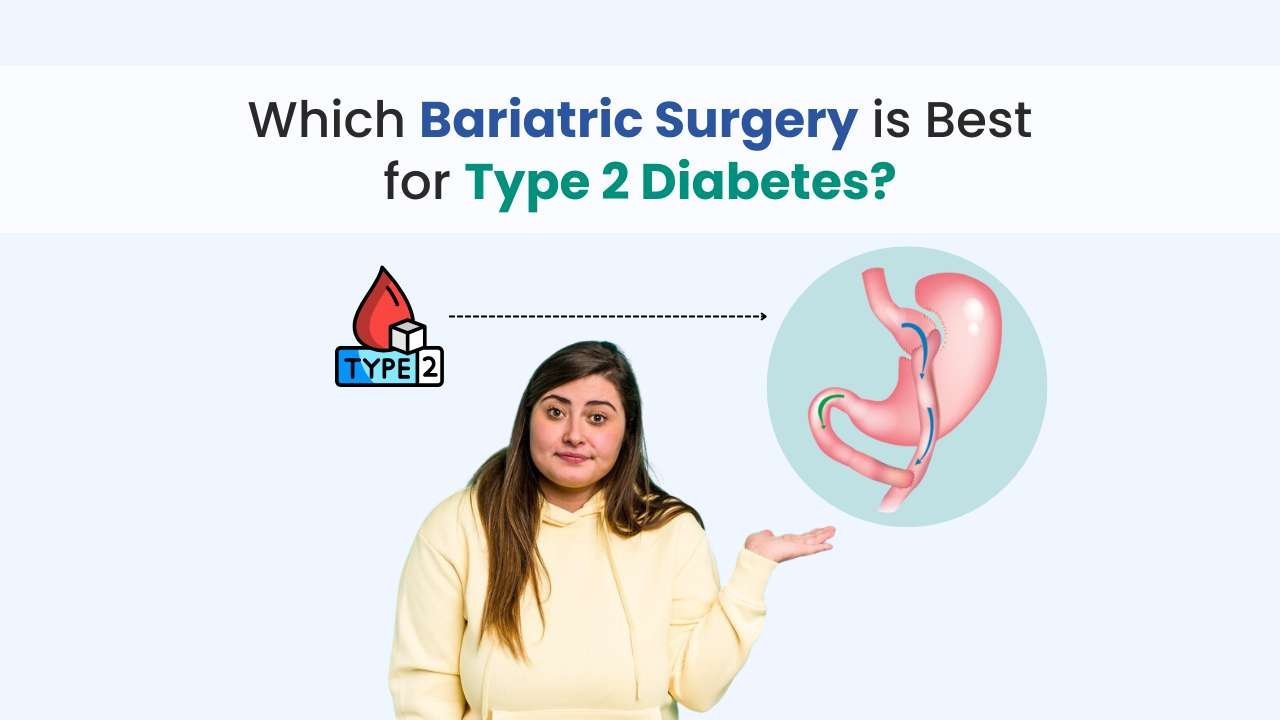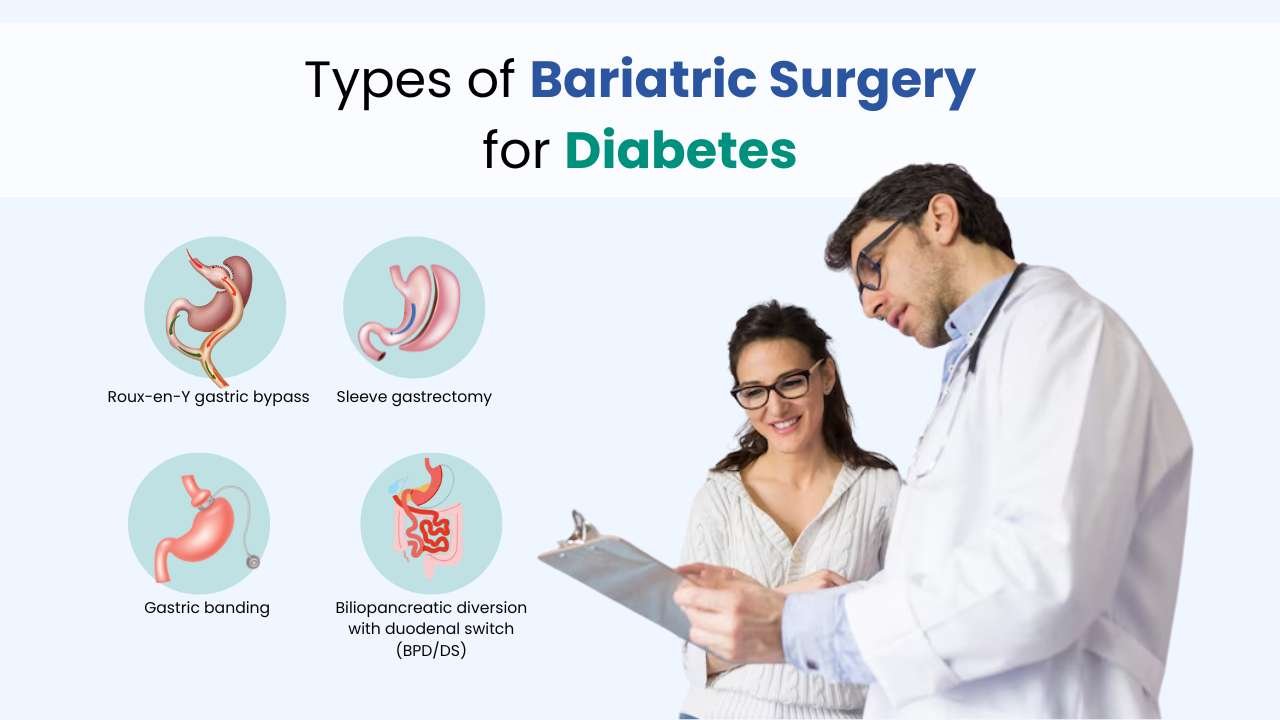Home Blogs Bariatric Surgery Bariatric Surgery and Diabetes: Procedures, Success Rates, and Myths

Do you have uncontrolled diabetes and want to get Bariatric Surgery?
Bariatric surgery is also known as weight loss surgery, which involves various procedures, such as sleeve gastrectomy, gastric bypass, etc. However, which one is a better option for type 2 diabetes is a tricky question.
Let’s read more and get knowledge about the procedure, success rate, and myths.

Metabolic surgery and bariatric surgery are alternative names for weight loss surgery. To convey the effect of these procedures on patients' weight and the state of their metabolism (the process by which food is converted into energy), these phrases are utilized. Among other conditions, these surgeries are so highly successful in treating diabetes, high blood pressure, sleep apnea, high cholesterol, and obesity. Additionally, these procedures can also help avoid health issues in the future. Patients with obesity who decide to receive therapy can benefit from increased longevity and a higher quality of life.

Gastric bypass surgery is the best surgical option for type 2 diabetes because it helps in lowering your blood pressure the most, and can also lead to remission for some patients. However, remission refers to when your blood sugar stays in a healthy range without the requirement for diabetes medication.
According to 2024 reports, patients who have undergone gastric bypass surgery achieve better long-term blood sugar management than patients who have undergone other types of bariatric surgeries.
Here are some major points why gastric bypass surgery is the best choice for type 2 diabetes patients:
Even before they lose a lot of weight, many patients experience normal blood sugar levels within a few days of surgery. This is not only a result of calorie restriction, but also of strong hormonal changes.
Between 60 and 80 percent of individuals achieve diabetes remission (normal HbA1c- 3-month blood sugar level without medication) during the first year or two.
superior to a sleeve gastrectomy or only medication.
Insulin resistance improves with significant and long-term weight loss (the body responds better to insulin). Inflammation and liver fat both raise diabetes.
Research indicates that patients who have had gastric bypass surgery take a lower dose or no diabetes drugs. Regardless of the severity of diabetes, gastric bypass surgery was likewise predicted to have the greatest outcomes.
The bariatric procedures used today for diabetes patients are among the most researched medical procedures of our time, having been improved over many decades. They are carried out utilizing robotic and laparoscopic surgery, two minimally invasive surgical procedures, and tiny incisions.
Almost all patients who undergo diabetic surgery experience improvements in their condition, sometimes within a few days of the procedure. Their diabetes-related health issues improve, their blood sugar levels drop, and they require fewer diabetes drugs. These procedures reduce the amount of food consumed and the number of calories absorbed.
The step-by-step Gastric sleeve procedure is as follows:
Primarily, these procedures alter metabolism, which impacts intestinal hormones that govern blood sugar levels, frequently before weight loss. Furthermore, these processes facilitate the body's capacity to reach a healthy weight, decrease appetite, and enhance feelings of fullness. In addition to being the most successful treatment for diabetes, diabetic surgery also significantly reduces obesity and other related problems. Hence, this is how Bariatric surgery reverses diabetes.
Having uncontrolled diabetes is the major reason to undergo Bariatric surgery. The points below are an addition.

Bariatric surgery comes in four primary forms.
Roux-en-Y gastric bypass: A portion of your small intestine is cut, and a little pouch is created in your stomach. This restricts your food intake and may alter hormones that influence blood sugar regulation and hunger.
Sleeve gastrectomy: This operation leaves a tiny sleeve-like region after the majority of your stomach is removed. It aids in cutting back on food intake and influences gut hormones related to hunger and blood sugar regulation, which results in weight loss.
Gastric banding: A physician creates a little pouch by wrapping a band around the upper portion of your stomach. However, physicians do this procedure less frequently.
Biliopancreatic diversion with duodenal switch (BPD/DS): This procedure involves removing a portion of the stomach and rerouting the intestines. However, this procedure is associated with the highest risk of vitamin shortages and frequently results in the greatest weight loss.
Yes, bariatric surgery can reverse or improve type 2 diabetes in patients through several mechanisms. However, a better diet and weight loss can help in reversing the cause.
Yes, gastric bypass surgery is reported to provide glycemic control and also cure type 2 diabetes in obese patients by reducing insulin resistance.
Bariatric and metabolic surgery performed in a certified facility carries the lowest perioperative risks.
Among the difficulties are:
These issues have the potential to raise expenses, prolonged hospital stays, and result in serious morbidity. Blood leak may only be detected in the early stages by a high heart rate.
Prolonged nausea and vomiting brought on by small-bowel blockage are possible later issues.
In order to guarantee sufficient weight loss and avoid problems, metabolic and bariatric surgery patients should have regular long-term follow-up. During the first six months following surgery, patients should be monitored every four to twelve weeks. After that, they should be monitored regularly.
Blood pressure and weight are measured, and dietary patterns are examined. Regular blood tests are performed. Before surgery, if fasting lipid levels and glycosylated hemoglobin (HbA1c) were abnormal, they should be checked. Calcium, vitamin D, vitamin B12, folate, iron, and thiamin (vitamin B1) are among the vitamins and minerals that may need to be checked, depending on the operation.
After gastric bypass surgery, there is a risk of getting type 2 diabetes, which is significantly rare but is a possibility, especially in obese patients.
MYTH 1: All weight loss surgeries are the same.
There are numerous methods for performing weight loss surgery. In the past, surgeons frequently performed gastric band surgery, which involves using an adjustable band to cut off the stomach.
Sleeve gastrectomy, which shrinks the stomach to about the size of a banana, and laparoscopic gastric bypass, which joins a small portion of the stomach to a later section of the small intestine, are the most popular procedures nowadays. This way, food avoids the majority of the stomach and a portion of the small intestine.
MYTH 2: Weight loss procedures carry a high risk.
The dangers associated with obesity are typically more than those with bariatric surgery. According to studies, surgical weight loss reduces premature death from all causes by about 90% and dramatically lowers the rates of fatal conditions like diabetes, high blood pressure, and heart disease. Bariatric treatments are among the safest on the operating table, but all surgeries have hazards.
MYTH 3: Having weight loss surgery is an easy solution.
Weight reduction surgery will help you lose weight quickly, but it's only one part of a multifaceted approach to treating obesity. Along with going through psychological and physical evaluations, surgical candidates also consult with a dietitian to ensure they are prepared to make the lifestyle adjustments required to maintain their weight loss following surgery. It usually takes four to six months to complete the recovery process.
MYTH 4: Bariatric surgery only benefits appearance.
The true advantages of weight loss surgery are longevity and health, even though losing weight can significantly improve your appearance. Over 40 chronic health issues are associated with obesity, and weight loss surgery can help reduce the effects of each one.
Up to 80% of patients with Type 2 diabetes have remission after bariatric surgery, which allows them to quit taking medication and return to normal blood sugar levels.
MYTH 5: Many patients regain the lost weight.
Within five years following weight reduction surgery, about 30% of individuals recover a significant portion of their lost weight. This indicates that 70% of those who lose weight continue to do so.
Regardless of the patient's lifestyle choices, the majority of weight loss occurs in the first eight to twelve months following surgery. Regretfully, surgery's hormonal effects wear off over time. Therefore, you will recover the weight you lost after the honeymoon phase if you collapse on the couch following surgery and resume your bad eating habits.
FAQs
The best bariatric surgery for type 2 diabetes is frequent gastric bypass; however, depending on your medical circumstances, other treatments like the gastric sleeve surgery may be more effective.
Gastric Bypass is reported to be the best for type 2 Diabetes.
The cost of Bariatric surgery in India is 5500-6500 USD.
The fact that type 2 diabetes is reversible is not widely known. Dietary and physical activity modifications can help manage the condition, but they are not usually sufficient to prevent its progression and the development of other major health issues. Thus, some individuals with type 2 diabetes may benefit from the gastric sleeve surgery.
The fact that type 2 diabetes is reversible is not widely known. Dietary and physical activity modifications can help manage the condition, but they are not usually sufficient to prevent its progression and the development of other major health issues.
Upon weighing the advantages and disadvantages of minimally invasive weight loss surgery, we may conclude that the Gastric sleeve surgery is the most secure procedure. Your stomach will get smaller as a result of this procedure, which will make you eat less. There is a chance of difficulties and adverse effects, though, just like with most surgical operations.

Written By
A hard working, patient centred, skillful and knowledgeable doctor who is always ready to learn.
From a very young age she aspired to be in the medical field, to help cure the ailing. She believes that relief on the patient's face, the smile of gratitude and the feeling of helping someone is all what matters.
SOURCE
HISTORY
At Mejocare, we prioritize accuracy and reliability. Our content is based on peer-reviewed studies, academic research, and medical associations. We avoid tertiary references. Learn more in our editorial policy. Trustworthy health information for you.
https://asmbs.org/patients/surgery-for-diabetes/. https://www.msdmanuals.com/professional/nutritional-disorders/obesity-and-the-metabolic-syndrome/metabolic-and-bariatric-surgery https://psrihospital.com/safest-and-minimal-invasive-weight-loss-surgery/ https://www.templehealth.org/about/blog/how-bariatric-surgery-can-reverse-type-2-diabetes https://www.nih.gov/news-events/nih-research-matters/weight-loss-surgery-yields-long-term-benefits-type-2-diabetes
CURRENT VERSION
Our care team can help you.
